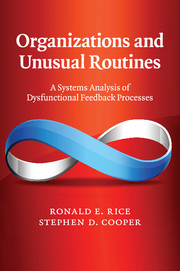Book contents
- Frontmatter
- Contents
- List of figures
- List of tables
- List of boxes
- Preface
- Acknowledgments
- 1 Crazy systems, Kafka circuits, and unusual routines
- 2 Causes, symptoms, and subroutines of unusual routines in six computer information/communication systems
- 3 Getting personal: unusual routines at the customer service interface
- 4 A multi-theoretical foundation for understanding unusual routines
- 5 A detailed case study of unusual routines
- 6 Summary and discussion of the case study results
- 7 Individual and organizational challenges to feedback
- 8 A multi-level and cross-disciplinary summary of concepts related to unusual routines
- 9 Recommendations for resolving and mitigating unusual routines and related phenomena
- 10 Summary and a tentative integrated model of unusual routines
- References
- Index
7 - Individual and organizational challenges to feedback
Published online by Cambridge University Press: 10 January 2011
- Frontmatter
- Contents
- List of figures
- List of tables
- List of boxes
- Preface
- Acknowledgments
- 1 Crazy systems, Kafka circuits, and unusual routines
- 2 Causes, symptoms, and subroutines of unusual routines in six computer information/communication systems
- 3 Getting personal: unusual routines at the customer service interface
- 4 A multi-theoretical foundation for understanding unusual routines
- 5 A detailed case study of unusual routines
- 6 Summary and discussion of the case study results
- 7 Individual and organizational challenges to feedback
- 8 A multi-level and cross-disciplinary summary of concepts related to unusual routines
- 9 Recommendations for resolving and mitigating unusual routines and related phenomena
- 10 Summary and a tentative integrated model of unusual routines
- References
- Index
Summary
A seemingly straightforward solution to preventing, avoiding, mitigating, or resolving unusual routines would be to vigorously institutionalize feedback from users and participants, both internal and external to the organization, which would then be analyzed and used to adapt or correct the problem. Certainly task and performance feedback is a central concept in organizational management. Feedback is presumed to foster organizational learning and improved productivity through identifying problems in past performance, providing ways to resolve those problems, reinforcing organizational goals, and helping employees improve their interpersonal competence through providing credible information about their impact on others (Ang et al., 1993; March, 1991). Job feedback may be explicitly about individuals and their absolute performance, or socially comparative, relative to others. Errors provide opportunities, through feedback, for organizational learning, especially if they reveal underlying causes and lead to implementing positive changes (Tax and Brown, 1998). Garvin (1993) compiled a list of definitions of organizational learning that ranged from “the detection and correction of error” (Argyris and Schon, 1978, p. 2) to “encoding inferences from history into routines that guide behavior” (Levitt and March, 1995, p. 517) to “the process of improving actions through better knowledge and understanding” (Fiol and Lyles, 1985, p. 808).
- Type
- Chapter
- Information
- Organizations and Unusual RoutinesA Systems Analysis of Dysfunctional Feedback Processes, pp. 217 - 251Publisher: Cambridge University PressPrint publication year: 2010



